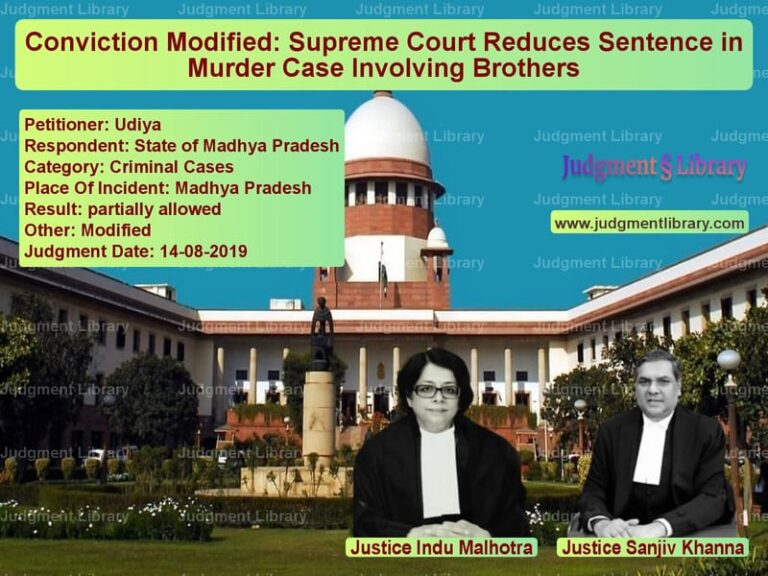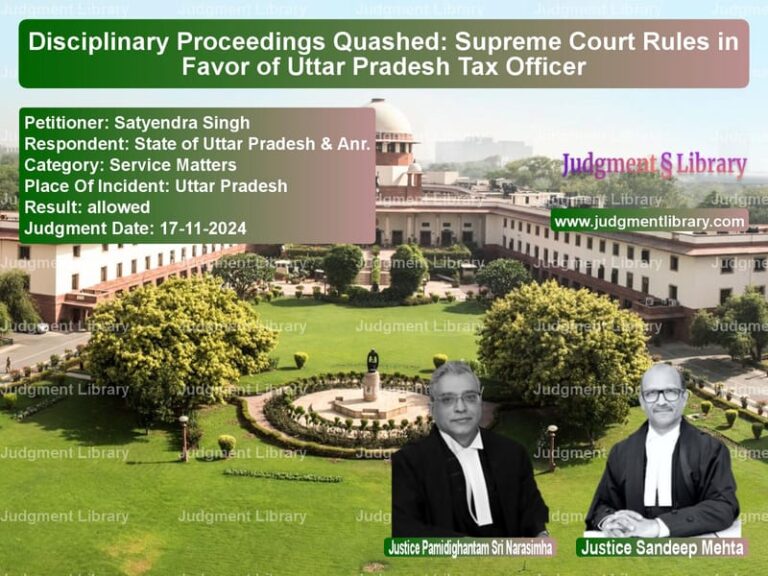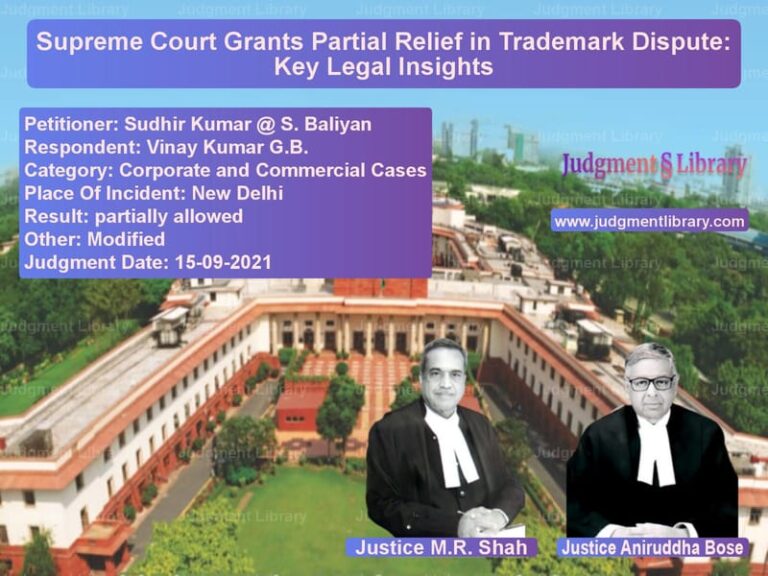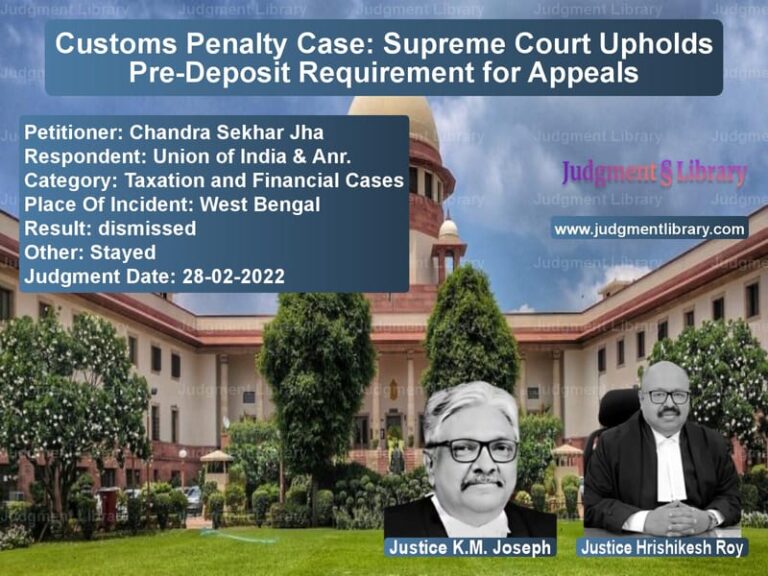Supreme Court Strikes Down Gujarat Government’s Cutoff Reduction: Recruitment Rules Must Be Followed
The Supreme Court of India recently delivered a significant judgment in the case of Sureshkumar Lalitkumar Patel & Ors. vs. State of Gujarat & Ors., which involved a contentious issue regarding the reduction of qualifying marks in a government recruitment process after the publication of results. The case revolved around whether the Gujarat government’s decision to lower the cutoff marks for Supervisor Instructor Class III post violated established recruitment norms and the rights of candidates.
Background of the Case
The Gujarat government issued recruitment notifications on September 5, 2015, for the post of Supervisor Instructor in various trades. A Selection Committee was formed, and cutoff marks were initially set as follows:
- General Category: 60% (180 marks out of 300)
- Socially and Educationally Backward Classes (SEBC): 57% (171 marks)
- Scheduled Castes (SC) and Scheduled Tribes (ST): 55% (165 marks)
The advertisement also mentioned that special horizontal reservations were made for women, ex-servicemen, and physically handicapped candidates. However, it clearly stated that if suitable candidates were unavailable in these categories, the unfilled seats would be allocated to other eligible candidates from the respective categories.
After the results were published, the Gujarat government, in an attempt to fill vacancies in the horizontal reservation categories, lowered the qualifying marks:
- General Category: 40%
- SC/ST/SEBC: 35%
This decision was challenged by candidates who had already secured their positions based on the original cutoff criteria.
Petitioners’ Arguments
- The petitioners argued that the Selection Committee did not have the power to lower the cutoff marks after the recruitment process had begun.
- They contended that the government’s action violated the principle that rules of a competitive selection process cannot be changed once the process has started.
- The reduction in marks was arbitrary and unfair to candidates who had already secured their positions under the original criteria.
- The action of the Gujarat government was akin to treating a horizontal reservation as a vertical one, which was legally incorrect.
Respondents’ Arguments
- The Gujarat government and the Selection Committee defended their decision by stating that reducing the cutoff marks was a policy decision aimed at ensuring sufficient representation in the reserved categories.
- They argued that since only the marks were published and the final selection list was yet to be issued, the change did not violate any established rules.
- The government contended that as long as no fundamental rights were infringed upon, the courts should not interfere in policy decisions.
Key Observations by the Supreme Court
The Supreme Court made several crucial observations in its judgment:
- The Court held that the recruitment process had to be conducted as per the advertised criteria, and no changes could be made post-results unless explicitly provided for in the rules.
- It observed that reducing the cutoff marks was not a mere policy decision but an arbitrary change that disrupted the fairness of the selection process.
- The Court reaffirmed that rules of the game cannot be changed midway, citing precedents such as Tej Prakash Pathak v. Rajasthan High Court and Veerendra Kumar Gautam v. Karuna Nidhan Upadhyay.
- It emphasized that candidates who had already qualified under the original criteria had a legitimate expectation of appointment, and such changes post-results were unfair.
- The Court also clarified that while the government has the right to frame policies, it must do so within the legal framework and not in a manner that prejudices meritorious candidates.
Judgment
The Supreme Court struck down the Gujarat government’s decision to lower the cutoff marks post-results, ruling in favor of the petitioners. It directed the authorities to revert to the original qualifying marks and proceed with the selection accordingly.
However, recognizing that several candidates had already been appointed based on the lowered cutoffs, the Court exercised its powers under Article 142 of the Constitution and allowed them to continue in service while ensuring that meritorious candidates were not deprived of their positions.
Implications of the Judgment
The ruling has broad implications for government recruitment and selection processes:
- It reinforces the principle that recruitment rules cannot be arbitrarily changed after the process has begun.
- The judgment upholds the rights of meritorious candidates and prevents unfair advantages being given through post-result policy changes.
- It clarifies that horizontal reservations should not be treated as vertical reservations in a manner that disrupts selection processes.
- The ruling sets a precedent for future recruitment cases, ensuring that governments adhere to advertised criteria strictly.
Conclusion
This judgment is a landmark ruling in public sector recruitment law. By striking down the arbitrary reduction of cutoff marks, the Supreme Court has upheld fairness and transparency in the selection process. It also ensures that policy decisions do not infringe upon the rights of meritorious candidates. The case serves as an important precedent for all government recruitment examinations, reinforcing that rules set at the start of a selection process must be honored until its conclusion.
Petitioner Name: Sureshkumar Lalitkumar Patel & Ors..Respondent Name: State of Gujarat & Ors..Judgment By: Justice M. M. Sundresh, Justice Sanjiv Khanna.Place Of Incident: Gujarat, India.Judgment Date: 20-02-2023.
Don’t miss out on the full details! Download the complete judgment in PDF format below and gain valuable insights instantly!
Download Judgment: sureshkumar-lalitkum-vs-state-of-gujarat-&-o-supreme-court-of-india-judgment-dated-20-02-2023.pdf
Directly Download Judgment: Directly download this Judgment
See all petitions in Recruitment Policies
See all petitions in Employment Disputes
See all petitions in Public Sector Employees
See all petitions in Promotion Cases
See all petitions in Termination Cases
See all petitions in Judgment by M.M. Sundresh
See all petitions in Judgment by Sanjiv Khanna
See all petitions in allowed
See all petitions in Modified
See all petitions in supreme court of India judgments February 2023
See all petitions in 2023 judgments
See all posts in Service Matters Category
See all allowed petitions in Service Matters Category
See all Dismissed petitions in Service Matters Category
See all partially allowed petitions in Service Matters Category







